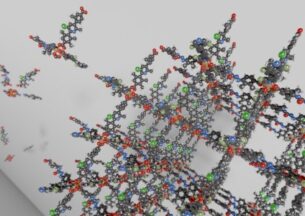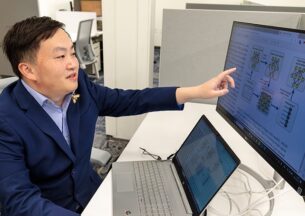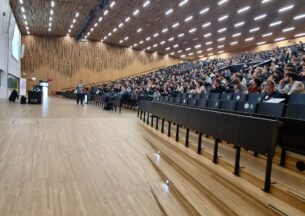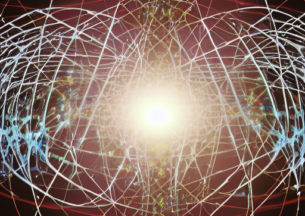New AI + Science Grants Fund Projects & Workshops in Chemistry, Physics, and CS Education
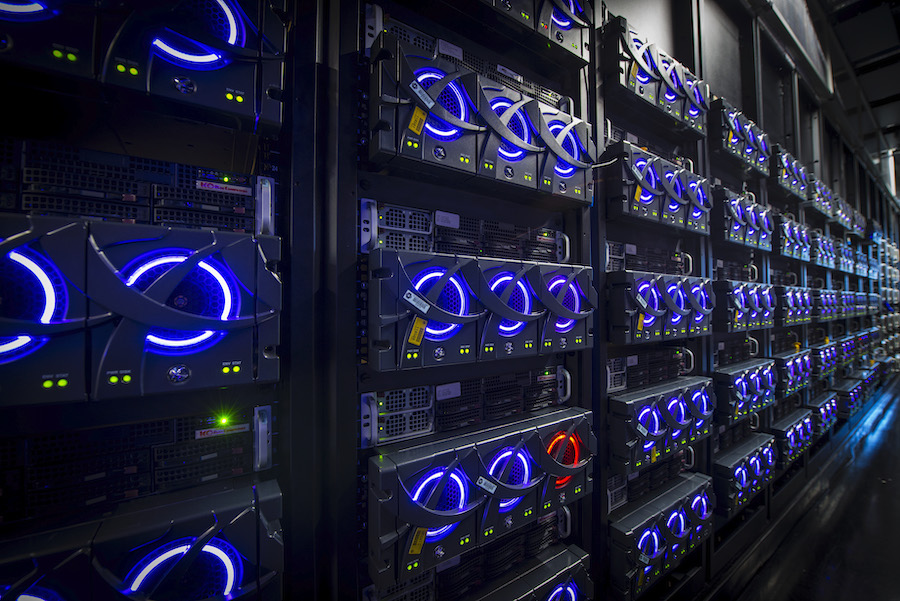
Artificial intelligence is a valuable lab assistant, diving deep into scientific literature and data to suggest new experiments, measurements, and methods while supercharging analysis and discovery. AI approaches hold promise for improving models of climate and the universe, transforming waste products into energy sources, detecting new particles at the Large Hadron Collider, and countless other scientific challenges.
In the second round of AI + Science grants awarded by UChicago’s Office of Research and National Laboratories Joint Task Force Initiative, three projects and two workshops will explore these new applications and how they can boost scientific discovery and education. The Joint Task Force, made up of researchers from the University of Chicago, Argonne National Laboratory, and Fermi National Accelerator Laboratory working with the Center for Data and Computing, will distribute $250,000 in funding to recipients from all three institutions. The first round of AI + Science grants was awarded last year.
Since the Joint Task Force Initiative launched in 2018, the University has committed significant investments to fund national laboratory programs and operations. The University manages Argonne for the U.S. Department of Energy through UChicago Argonne, LLC and Fermilab together with the Universities Research Association, Inc. through the Fermi Research Alliance.
“Big ideas require collaboration across institutions, and the University of Chicago, Argonne, and Fermilab collectively have the power to make great leaps in combining artificial intelligence and science,” said Juan de Pablo, vice president for national laboratories at the University. “I look forward to seeing what breakthroughs come from these grants.”
Seed Projects
AI+EC (Artificially Intelligent Electrochemistry)
Carbon dioxide emissions are a leading contributor to global climate change, but with the right electrocatalyst and electrolyte, it could instead be a new resource for energy sustainability. The team of Chibueze Amanchukwu, an assistant professor at the Pritzker School of Molecular Engineering, and Rajeev Assary, a staff scientist at Materials Science Division of Argonne, will use AI to find new, efficient ways of “recycling” CO2 into valuable products such as ethanol and ethylene, using clean electricity generated from the sun and wind. The researchers will use quantum chemistry-informed machine learning to sift through computational and experimental data and find new electrolytes that can improve the conversion process. Experiments will then be performed using these obtained chemical insights.
Learned Emulators of Physics Simulations
Researchers studying climate, astrophysics, and high-energy physics use large, complex simulations to guide experiments and test theories. These compute-intensive programs can run much faster using emulators that approximate some aspects of those models. Recently, scientists have started creating “learned emulators” using AI neural network approaches, but have not yet fully explored the advantages and potential pitfalls of these surrogates. These aspects will be examined by the team of Rebecca Willett, professor of computer science and statistics at UChicago, Dana Mendelson, assistant professor of mathematics at UChicago, Prasanna Balaprakash, computer scientist at Argonne, Jiali Wang, assistant atmospheric scientist in Environmental Science Division at Argonne, and Rao Kotamarthi, department head of atmospheric science and climate and chief scientist for the Environmental Science Division at Argonne. This team will explore the mathematical limits of these methods and quantify key trade offs related to accuracy and speed.
Real-Time Adaptive Deep Learning with System-on-Chip Devices for Discovery Science
Machine learning on data is typically performed after it is gathered. But advances in real-time machine learning can analyze data on the fly, allowing scientists to quickly adjust experiments to capture phenomena of interest. That’s particularly appealing to researchers using the Large Hadron Collider at CERN, where a single on-chip system can absorb multiple terabytes of data each second. David Miller, associate professor of physics at UChicago, Nhan Tran, Wilson Fellow at Fermilab, and Andrew A. Chien, professor of computer science at UChicago, will collaborate on the design of new hardware that enables these advanced real-time processes. The resulting “system-on-a-chip” hardware design would help both high-energy physicists and researchers in other data-intensive fields monitor data quality and detect promising results without interrupting the flow of data.
Workshops
AI + Measurements Workshop
AI can also guide scientific experiments before they are started, helping researchers find the best location to aim a telescope or choose which chemical compounds hold the greatest potential as drugs or new materials. Additionally, all modern scientific measurement requires inverting a model of the measurement process to interpret the data, and modern AI techniques have shown great promise in accelerating and improving this reconstruction. The “AI + Measurements” workshop, planned by Eric Jonas and Yuxin Chen, assistant professors of computer science at UChicago, and Jayakar Thangaraj of the lllinois Accelerator Research Center (IARC) at Fermilab, will dig into these opportunities for AI in meteorology, cosmology, particle physics, chemistry and other fields. The workshop will take place at Fermilab and include students and researchers from UChicago, Argonne, and the Toyota Technological Institute at Chicago, brainstorming new collaborations combining cutting-edge AI approaches and experimental science.
AI+Science = CS4All High School Primer Workshop
For most Chicago Public Schools students, exposure to computer science is limited and they have little time for advanced topics such as AI or data science for societal issues. This lack of opportunity is exacerbated when students seek internships and other employment experiences and do not have the confidence in their own knowledge to see CS, data science or AI as a possible career pathway for themselves. To address this need, a team of researchers and educators from Argonne, UChicago’s Center for Data and Computing (CDAC) and Fermilab will develop a CS/AI bridge workshop that supports students from Chicago’s South Side community. In the weeklong workshop, to be held twice a year, students will develop a deeper understanding of CS, grow a tangible skillset that is grounded in scientific projects, real-world datasets, and professional tools, and connect with internship opportunities at UChicago, Argonne and Fermilab. The workshop planning committee includes Julia Lane, Nick Feamster, and Kyle Chard from CDAC, Michael Papka, Meridith Bruozas and John Domyancich from Argonne, and Brian Nord from Fermilab.




